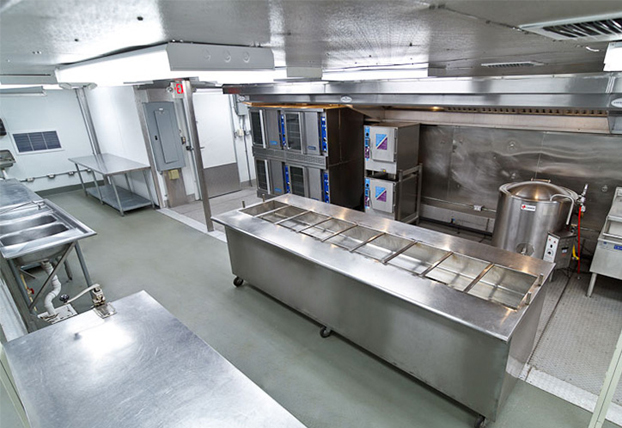In today’s world, sustainability has become a pressing concern across industries, and the food business is no exception. With the growing demand for environmentally friendly practices, food businesses and commercial kitchens are adopting sustainable measures to reduce their ecological footprint.
In this blog post, we will explore various sustainable practices that can be implemented in food businesses and commercial kitchens, with a specific focus on the benefits and considerations of temporary kitchens and renting kitchen space.
Embracing Temporary Kitchens: A Flexible and Sustainable Solution

Temporary kitchens are gaining popularity among food businesses as they offer flexible and sustainable solutions. By utilizing modular structures, these kitchens can be set up in various locations, allowing businesses to serve customers at different events or markets. This mobility reduces the need for multiple permanent establishments, saving energy and resources.
Energy-Efficient Appliances: Reducing Consumption and Costs
One of the key aspects of sustainable practices in commercial kitchens is the use of energy-efficient appliances. By replacing outdated equipment with energy-saving alternatives, businesses can significantly reduce energy consumption and lower utility costs. Investing in appliances with ENERGY STAR® certification ensures high energy efficiency without compromising performance.
Waste Reduction and Recycling: Closing the Loop

Sustainable food businesses prioritize waste reduction and recycling as part of their operations. Implementing comprehensive recycling programs for glass, plastic, and paper products is essential. Additionally, initiatives like composting food waste can significantly reduce the amount of organic matter sent to landfills, while creating nutrient-rich soil for gardening or farming.
Locally Sourced Ingredients: Supporting the Community and Reducing Carbon Footprint

By sourcing ingredients locally, food businesses not only support local farmers and producers but also contribute to reducing their carbon footprint. Locally sourced ingredients require less transportation, leading to lower emissions and fresher, more flavorful dishes. Establishing partnerships with nearby farms and suppliers fosters a sense of community and builds trust with customers.
Water Conservation: Preserving a Precious Resource

Conserving water is vital for sustainable practices in commercial kitchens. Simple measures like fixing leaks, installing low-flow faucets, and using water-efficient dishwashers can make a significant difference. Additionally, collecting and reusing water for tasks like irrigation or cleaning can help reduce water waste and promote sustainable water management.
Sustainable Packaging: Minimizing Environmental Impact
Food businesses can adopt sustainable packaging solutions to minimize their environmental impact. Switching to compostable or biodegradable packaging materials reduces the amount of waste that ends up in landfills. Encouraging customers to bring their own reusable containers or offering eco-friendly packaging alternatives can further promote sustainable practices.
Employee Education and Engagement: Creating a Culture of Sustainability

To truly embed sustainable practices in food businesses and commercial kitchens, employee education and engagement are essential. Conducting training sessions to raise awareness about sustainability, encouraging employees to contribute innovative ideas, and recognizing their efforts can foster a culture of sustainability within the organization.
Efficient Waste Management: Streamlining Processes for Sustainability
Implementing efficient waste management systems is crucial for sustainable practices in food businesses. By conducting waste audits and analyzing the types and quantities of waste generated, businesses can identify areas for improvement. This data can guide the implementation of recycling programs, food waste reduction strategies, and proper disposal methods. Regular monitoring and evaluation of waste management processes ensure ongoing sustainability efforts.
Energy Conservation: Optimizing Operations for Efficiency
Energy conservation plays a vital role in sustainable practices within commercial kitchens. Businesses can adopt several energy-saving measures to optimize their operations. These include installing motion-sensor lighting systems, utilizing programmable thermostats, and implementing smart HVAC controls. Training staff in energy-efficient practices, such as turning off equipment when not in use and optimizing cooking processes, can further contribute to energy conservation and cost reduction.
Sustainable Food Transportation: Reducing Emissions and Food Loss

Efficient and sustainable food transportation is a critical aspect of sustainable practices in the food industry. Businesses can explore alternative transportation methods such as electric vehicles or biodiesel-powered trucks to reduce carbon emissions. Optimizing delivery routes and utilizing advanced tracking systems can minimize travel distances and improve delivery efficiency. Additionally, adopting proper packaging and handling practices during transportation can help reduce food loss and waste.
Green Cleaning Practices: Eco-Friendly Cleaning Solutions

Commercial kitchens require thorough cleaning to maintain hygiene standards, but this process can also have an environmental impact. By opting for eco-friendly cleaning solutions, businesses can minimize the use of harsh chemicals that are harmful to both the environment and human health. Switching to biodegradable cleaning products and implementing water-saving cleaning techniques, such as using high-pressure nozzles or steam cleaning, can promote sustainability without compromising cleanliness.
Collaborative Partnerships: Building Sustainable Networks
Collaborative partnerships are instrumental in fostering sustainable practices in food businesses and commercial kitchens. Establishing relationships with suppliers who prioritize sustainability ensures access to ethically sourced ingredients and products. Engaging with sustainability-focused organizations and industry networks can provide valuable resources, knowledge sharing, and opportunities for collective sustainability initiatives. By working together, businesses can amplify their impact and create a more sustainable food ecosystem.
Continuous Improvement and Innovation: Staying Ahead of the Curve
Sustainability in the food industry is an evolving field, requiring businesses to stay proactive and continuously seek improvement and innovation. Regularly assessing current practices, exploring emerging technologies, and keeping up with industry trends enables businesses to adapt and implement new sustainable solutions. Engaging with sustainability certifications and programs, such as LEED or Green Restaurant Association certification, demonstrates a commitment to ongoing improvement and provides benchmarks for success.
Renting Kitchen Space: Sharing Resources for Sustainability

Renting kitchen space is a practical approach for food businesses seeking sustainable practices. Instead of building and maintaining their own commercial kitchen, businesses can share a communal commercial kitchen space with other ventures. These spaces are sometimes called ghost kitchens and offer numerous benefits for food creators. This collaborative approach promotes resource sharing and minimizes waste, making it an excellent choice for startups or businesses with limited budgets.
Consumer Education and Engagement: Empowering Sustainable Choices
Educating and engaging consumers is essential for promoting sustainable practices in food businesses. By transparently communicating their sustainability initiatives, businesses can raise awareness among customers and inspire them to make sustainable choices. Sharing information about locally sourced ingredients, eco-friendly packaging, and waste reduction efforts can help consumers feel connected to the business’s sustainability mission and encourage them to actively support sustainable practices.









